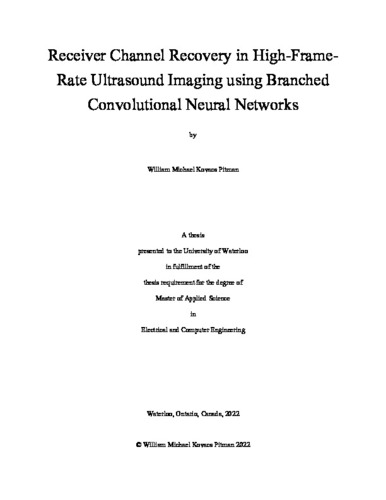| dc.contributor.author | Pitman, William | |
| dc.date.accessioned | 2022-08-22 14:56:52 (GMT) | |
| dc.date.available | 2023-08-23 04:50:04 (GMT) | |
| dc.date.issued | 2022-08-22 | |
| dc.date.submitted | 2022-08-10 | |
| dc.identifier.uri | http://hdl.handle.net/10012/18597 | |
| dc.description.abstract | High frame rate ultrasound (HiFRUS) is an imaging paradigm that utilizes unfocused transmissions to perform acquisitions at kilohertz frame rates, and its high temporal resolution enables its use in tracking dynamic physiological events. Integration of HiFRUS techniques into compact ultrasound scanners could enable use of the paradigm in more remote and austere healthcare settings. While desirable, the high data rates and dedicated receiver electronics required for HiFRUS acquisitions make their implementation on compact systems difficult. Reduction of the number of receiving channels in a HiFRUS system can alleviate constraints related to data rate and receiver electronics, however, this reduction either limits the field of view of an ultrasound system or it leaves the system prone to spatial aliasing artifacts. To enable systems to operate with a reduced set of receiving channels, radiofrequency (RF) channel recovery frameworks have been proposed. While initial feasibility has been demonstrated for recovery of half of a system’s receiving channels, higher degrees of recovery have minimal demonstrated viability. Higher degrees of recovery would allow for additional reduction in a system’s receiving channels, enabling HiFRUS principles to be applied in systems with more appreciable reductions in cost and form factor.
The goal of this thesis is to devise a receiver channel recovery framework that is generalizable to multiple levels of channel-wise downsampling, and to evaluate its ability to recover RF channels after downsampling degrees of 2-times and higher. To facilitate channel recovery at multiple rates, novel branching encoder-decoder convolutional neural networks (CNNs) were developed. These CNNs were trained to recover omitted RF channels from angled plane wave acquisitions after channel-wise downsampling rates of 2-times, 3-times, and 4-times. To evaluate the utility of the trained CNNs, recovered RF data was used for ultrasound image formation using delay-and-sum beamforming, and for coherent compounding of beamformed images. When the trained recovery frameworks were applied to downsampled acquisitions of an in vitro point target, in vivo carotids, and an in vivo quadriceps muscle, inclusion of CNN-inferred RF data removed spatial aliasing artifacts from the beamformed images, recovering their underlying structure.
The proposed framework may be used to enable HiFRUS techniques on more compact and inexpensive systems. This can help extend the reach of HiFRUS, bringing technology that utilizes this paradigm into the hands of more users. Additionally, insights presented in this work can also be used to guide further innovation, such as extension of channel recovery to 3D ultrasound or alternative transmissions schemes. | en |
| dc.language.iso | en | en |
| dc.publisher | University of Waterloo | en |
| dc.subject | High Frame Rate Ultrasound | en |
| dc.subject | Deep Learning | en |
| dc.subject | Convolutional Neural Network | en |
| dc.title | Receiver Channel Recovery in High-Frame-Rate Ultrasound Imaging using Branched Convolutional Neural Networks | en |
| dc.type | Master Thesis | en |
| dc.pending | false | |
| uws-etd.degree.department | Electrical and Computer Engineering | en |
| uws-etd.degree.discipline | Electrical and Computer Engineering | en |
| uws-etd.degree.grantor | University of Waterloo | en |
| uws-etd.degree | Master of Applied Science | en |
| uws-etd.embargo.terms | 1 year | en |
| uws.contributor.advisor | Yu, Alfred | |
| uws.contributor.affiliation1 | Faculty of Engineering | en |
| uws.published.city | Waterloo | en |
| uws.published.country | Canada | en |
| uws.published.province | Ontario | en |
| uws.typeOfResource | Text | en |
| uws.peerReviewStatus | Unreviewed | en |
| uws.scholarLevel | Graduate | en |

